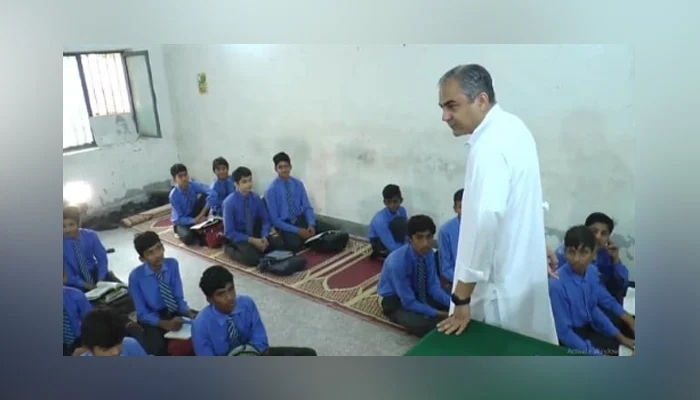Shall all govt schools get CM’s attention!
CARETAKER Punjab Chief Minister Mohsin Naqvi's visit to a public school in Model Town on Nov. 2 revealed severely inadequate conditions, including classrooms with no proper furniture, unclean and waterless washrooms, malfunctioning electric water coolers, and various issues such as broken furniture, damaged whiteboards, dilapidated doors, and non-functional computer and science labs.
This is the state of affairs of a government-run school in the heart of Lahore, raising concerns not only about the conditions of public schools in the provincial metropolis but also in far-flung and less affluent areas of Punjab. This particular school's condition is poised to improve significantly after the Chief Minister's visit drew attention to its plight. However, it raises the question of whether other government schools will receive the same attention. It also is worth pondering why the School Education Department or the District Education Authority (DEA) Lahore, with all its resources, was unable to address the issues at this school before the CM could point out after his visit to the school. Earlier in September, during a visit to a government school in Lahore’s Ravi Road area, CM Naqvi while expressing concerns over low attendance and the widespread cases of conjunctivitis (Pink eye infection) among both students and teachers had announced the closure of schools for two days.
It is pertinent to mention here that Punjab province sets itself apart in terms of data management, and within the Punjab government, the Schools Department shines with data-related initiatives. This includes real-time school monitoring data collected by hundreds of Monitoring and Evaluation Assistants (MEAs) during monthly spot visits across the province. This real-time data is about attendance of students and teachers as well as availability of facilities such as furniture, drinking water and even a school’s overall hygiene. But the key question remains: How can this valuable data be leveraged for informed decision-making? Despite the availability of real-time data on school conditions and student attendance, it is disheartening to see that those responsible, particularly the Schools Department, are not utilising this valuable information for informed decision-making.
The expectation is that these institutions should proactively utilise their resources, data insights, and awareness of the school conditions to make timely, informed decisions that safeguard the safety, well-being, and educational environment of students. During the CM's visit to the Model Town school, another notable development was the immediate halt to students being responsible for cleaning schools across Punjab. The CM instructed the Secretary Schools to issue a compliance notification on the same day. He also pledged to hold principals and school heads accountable for cleanliness issues when complaints arose. However, it's important to recognise that the hiring of janitorial staff, including sweepers, falls outside the purview of school heads.
According to the Schools Department's School Information System (SIS), there are a total of 5,571 sanctioned positions for sweepers in public schools throughout Punjab, with 2,419 of these positions currently vacant. Filling these vacancies is a responsibility that rests squarely with the School Department. It wouldn't be unreasonable for the Chief Minister to take decisive actions to rectify the issues and hold those responsible to account. The responsibility should extend beyond just the school heads, who often lack the resources beyond their allocated budgets.
Those who can truly make a difference, such as the Schools Department and the District Education Authorities (DEAs) in each district, should be held accountable for their roles in ensuring the proper management of school conditions, attendance, and overall student welfare. These institutions possess the necessary resources and influence to bring about meaningful change and should be actively engaged in upholding the well-being of our students.
-
 Kim Kardashian And Lewis Hamilton Make First Public Appearance As A Couple At Super Bowl 2026
Kim Kardashian And Lewis Hamilton Make First Public Appearance As A Couple At Super Bowl 2026 -
 Romeo And Cruz Beckham Subtly Roast Brooklyn With New Family Tattoos
Romeo And Cruz Beckham Subtly Roast Brooklyn With New Family Tattoos -
 Meghan Markle Called Out For Unturthful Comment About Queen Curtsy
Meghan Markle Called Out For Unturthful Comment About Queen Curtsy -
 Bad Bunny Headlines Super Bowl With Hits, Dancers And Celebrity Guests
Bad Bunny Headlines Super Bowl With Hits, Dancers And Celebrity Guests -
 Insiders Weigh In On Kim Kardashian And Lewis Hamilton's Relationship
Insiders Weigh In On Kim Kardashian And Lewis Hamilton's Relationship -
 Prince William, Kate Middleton Private Time At Posh French Location Laid Bare
Prince William, Kate Middleton Private Time At Posh French Location Laid Bare -
 Stefon Diggs Family Explained: How Many Children The Patriots Star Has And With Whom
Stefon Diggs Family Explained: How Many Children The Patriots Star Has And With Whom -
 ‘Narcissist’ Andrew Still Feels ‘invincible’ After Exile
‘Narcissist’ Andrew Still Feels ‘invincible’ After Exile -
 Shamed Andrew ‘mental State’ Under Scrutiny Amid Difficult Time
Shamed Andrew ‘mental State’ Under Scrutiny Amid Difficult Time -
 Bad Bunny's Super Bowl Halftime Show: What Time Will He Perform Tonight?
Bad Bunny's Super Bowl Halftime Show: What Time Will He Perform Tonight? -
 Where Is Super Bowl 2026 Taking Place? Everything To Know About The NFL Showdown
Where Is Super Bowl 2026 Taking Place? Everything To Know About The NFL Showdown -
 Chris Pratt Explains Why He And Katherine Schwarzenegger Did Premarital Counseling
Chris Pratt Explains Why He And Katherine Schwarzenegger Did Premarital Counseling -
 Drake 'turns Down' Chance To Hit Back At Kendrick Lamar At Super Bowl
Drake 'turns Down' Chance To Hit Back At Kendrick Lamar At Super Bowl -
 Sarah Ferguson Had A ‘psychosexual Network’ With Jeffrey Epstein
Sarah Ferguson Had A ‘psychosexual Network’ With Jeffrey Epstein -
 Miranda Kerr Shares The One Wellness Practice She Does With Her Kids
Miranda Kerr Shares The One Wellness Practice She Does With Her Kids -
 Czech Republic Supports Social Media Ban For Under-15
Czech Republic Supports Social Media Ban For Under-15




